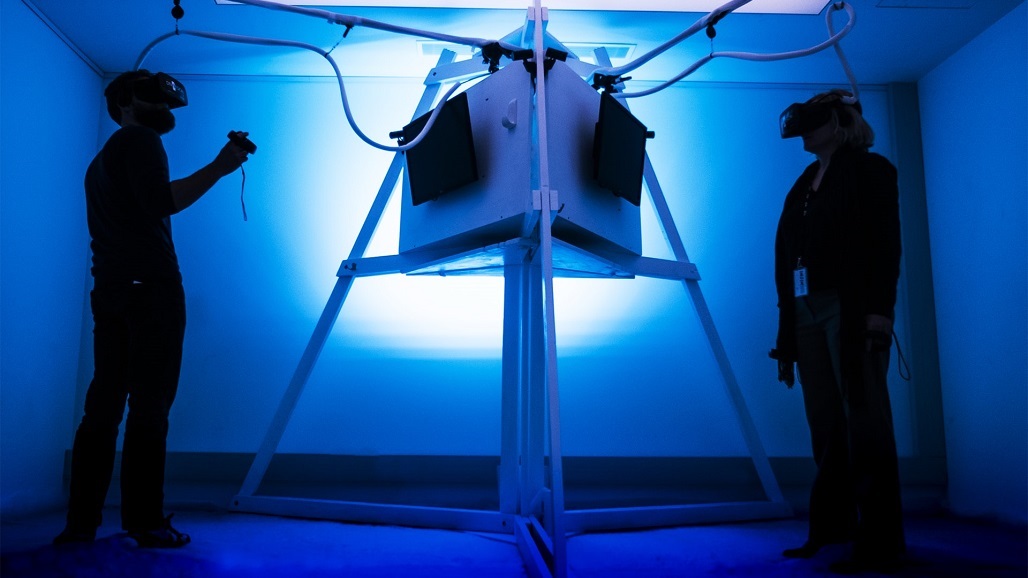Photo: Unsplash
In the near future, more brands will break the boundaries between virtual and reality to create more meaningful interactions with consumers.
 The metaverse is having its moment internationally, accelerated by COVID-19’s impact on digital-based economies and disruptions to offline business models. The rise of blockchain, digital assets, and nonfungible tokens (NFTs) further fuels the demand for the metaverse. Defined as a virtual-reality space in which users can interact, the metaverse is evolving into an increasingly vast and rich ecosystem that comprises metaverse gateways, platforms and infrastructures, as well as a variety of service providers to enhance the customer experience with identity, social, gaming and economic services.
The metaverse is having its moment internationally, accelerated by COVID-19’s impact on digital-based economies and disruptions to offline business models. The rise of blockchain, digital assets, and nonfungible tokens (NFTs) further fuels the demand for the metaverse. Defined as a virtual-reality space in which users can interact, the metaverse is evolving into an increasingly vast and rich ecosystem that comprises metaverse gateways, platforms and infrastructures, as well as a variety of service providers to enhance the customer experience with identity, social, gaming and economic services.
As we enter 2022 and beyond, here are our reflections on the impact of the metaverse in the real world in the next five years for various sectors, such as financial services, automotive and manufacturing, real estate, education, and retail.
Financial Services
If the metaverse develops like how NFTs have, it could be a massive growth opportunity for financial service players. NFT sales alone hit $2 billion in the first quarter of 2021, more than a 20-time increase from the previous quarter.
Looking out five years from now, we imagine a place where you have entire user-generated ecosystems, with the metaverse giving rise to virtual societies that transact and engage in a decentralized manner. You can expect to see:
- The development of virtual-to-physical redemptions and financial systems that underpin payments and financing in the ecosystem
- NFTs providing users digital ownership and driving the emergence of new access classes for trading
- Augmented reality/virtual reality (AR/VR) sophistication narrowing the differences between online and offline, driving greater participation and engagement in financial services, and ultimately fueling the convergence of traditional financial services and the new era of innovation
Traditional financial services players are already leaning into the potential of the metaverse. In Asia, banks are creating virtual spaces for branding, education and product development. Universal banks are using the metaverse for training and education for both internal stakeholders and external clients. Payment players are aggressively developing crypto propositions and partnerships to maximize their positioning in the metaverse. The integration of the metaverse and financial services is therefore not a question of “if” but “when.”
Automotive and Manufacturing
A shared online space that spans across dimensions, powered by a combination of VR, AR and MR (mixed reality), will enable the automotive and manufacturing industry to be deeply entrenched in the metaverse. Creating an industrial metaverse is possible if it organically integrates cyber-physical systems; digital twins; 5G-powered AR, VR, and AI computer vision; low latency remote control and other applications.
With an industrial metaverse, the future of factories will not only use AR/VR for on-site auxiliary installations or skills training, but also create an immersive and virtual experience of people working together in the virtual world, guided by AI to verify results and correct errors in real-time without needing to be on-site.
In addition, the company’s product design, development process, trial production testing, operation management, marketing, and other operations can be simulated and verified within the virtual community before transferring it to the physical world for actual production. Another application would be for decision-making and results to be recorded through the blockchain, as the basis for assessment and auditing in both the virtual and physical world.
In the automotive industry, cars have evolved from a simple getting from point A to B to a mobile space that integrates work, entertainment and other functions. Autonomous driving releases attention and hands for the driver and passengers to do work or enjoy an entertainment experience that is traditionally constrained to the office or home environment.
Put simply, the metaverse will leverage VR and AR in automobiles, layered onto existing technologies such as smart cockpits, voice recognition and AI.
In the next five years, we expect the metaverse and automobiles to develop in tandem. In addition to the virtual drive engine, more perceptive technologies such as touch and taste could be integrated, and possibly even developing a unique transaction method via blockchain in the metaverse for the automotive industry. For example, a virtual car is built in the metaverse and mapped to the real car and vice versa. Whether the driver is using the car in the physical or virtual world, driving behaviors, technology upgrades, modification preferences, and corresponding data generated can be shared between the two dimensions for a seamless experience.
In the near future, we anticipate more brands stepping in to break the boundaries between virtual and reality to create more innovative, meaningful interactions with consumers.
Real Estate
Land and real estate are important assets in the real world, which brings to question its value in the metaverse. We expect the metaverse to mirror and adopt characteristics of the real world, and the concept of supply and demand will affect the value and price of virtual land and real estate.
Like in the real world, location is a key factor affecting the value of land in the metaverse. The two factors that determine the value of the location are the distance from the center of the metaverse and the quality of neighbors. The buying behavior of many international celebrities has sparked heated discussions on the topic of virtual real estate investment.
However, in China, the trend may not pick up to the level of interest as in the West due to differences in understanding and perception around the metaverse. The metaverse attempts to mirror the rationally quantifiable physical world that is rooted in Western ideologies and culture, which does not align with the East. It would still take some time for the East to accept the concept of a rationally quantifiable world. Therefore, investments into virtual land and real estate in China are still speculative and will be accompanied by risks. As the concept gains popularity, it remains to be seen if price fluctuations will stabilize or continue to skyrocket and crash unpredictably.
Education
While the remote education experience has already improved greatly with campus digital twins, we expect the metaverse to naturally drive spatial changes throughout the education industry in the next five years. Pursuing knowledge will no longer be confined to words, images and lectures available on demand, but reimagined to include an immersive experience accompanied by digital records in the metaverse.
Education in the metaverse era is by no means confined to a realistic learning experience. We see the metaverse as the natural experimental playground for the education sector. Through collaboration and the establishment of a standard framework to create a shared digital ecosystem, the metaverse will realize the sharing of high-quality educational resources on a global scale, benefiting a wide range of audiences of all ages and social classes, and making education truly a lifelong endeavor.
Companies that have begun their foray into the metaverse help us imagine unlimited possibilities in the future of learning, illustrating an immersive experience of studying space and history in the metaverse. With many “top players” already declaring their focus on the education sector, unlocking the infinite possibilities of learning in the metaverse is only a matter of time.
Retail and Consumer Brands
In the era of digital consumption, brands continue to evolve their approach to establishing direct communication channels with consumers. From the early days of building a website, to embracing e-commerce, opening social media accounts, and even live broadcasting, the metaverse now offers a new concept for brands to experiment with.
The prevalence and growing importance of virtual characters or avatars have in recent times presents various business opportunities in the retail sector. Many consumers now expect a combination of in-store and digital experiences, and the metaverse offers the ability to engage with brands and products using a personalized avatar. Whether it’s trying out clothes, daily necessities, test-driving vehicles, or just elevating the browsing experience in a virtual store, the possibilities are endless.
The well-known simulation game The Sims 4 already gives us an insight into the metaverse. Consumer brands are actively collaborating with game developers to embed their products in all aspects of the game. Since its launch in 2014, consumer brands have launched item expansion packs for gamers to interact with the brands in the virtual world to raise brand awareness and cultivate brand love.
Beyond marketing products, brands have also organized or participated in interactive activities with consumers. The metaverse has become the new playground, especially for luxury fashion brands, with some launching their new collection in the virtual world and others partnering up with developers to create their own bespoke game.
In the near future, we anticipate more brands stepping in to break the boundaries between virtual and reality to create more innovative, meaningful interactions with consumers.
This article was originally published on Oliver Wyman’s WeChat account.
Related themes: NEW WAYS OF WORKING
 Jason Ekberg
Jason Ekberg
Partner at Oliver Wyman
Jason is a Partner of Corporate and Institutional Banking (CIB) practice at Oliver Wyman. Within CIB, he focuses on advising senior management, investors, and regulators on a range of topics spanning business strategy, transformation topics, and digital innovation.
 Junyi Zhang
Junyi Zhang
Managing Partner, Auto & Private Equity at Oliver Wyman
Zhang Junyi is a managing partner at Oliver Wyman, based in the Shanghai office, responsible for the automotive and private equity business in Greater China. Zhang Junyi has nearly 18 years of rich experience in management consulting, direct investment and corporate operations. He has executed strategic planning, operation and digitalization projects for hundreds of well-known automobile and travel industry companies, and participated in and led more than 50 cross-border and local Chinese companies.
 Leo Li
Leo Li
Partner and Head of Automotive, Manufacturing and Industrial Products, Greater China at Oliver Wyman
Leo Li is a partner and head of Automotive, Manufacturing and Industrial Products in Greater China. He has sixteen years in top-tier consulting firm experience.
Leo has consulted to a broad range of leading Chinese companies on issues of strategy planning, organization transformation, operation optimization, and digital innovation.
The original article can be viewed at the Brink’s website HERE.


Leave a Reply